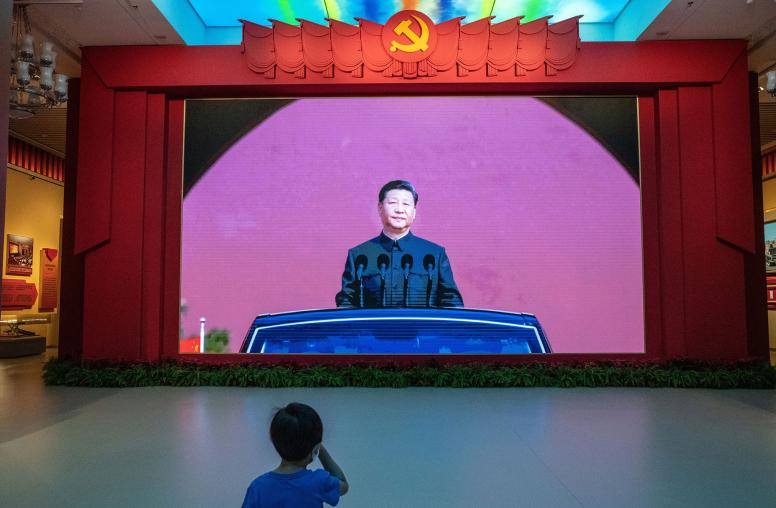Research & Analysis
U.S. Institute of Peace’s articles, reports, tools and other features provide policy analysis, research findings, and practitioner guides. These publications examine critical conflict issues at the center of the Institute’s work to prevent and resolve violent conflict.
The views expressed in these publications are those of the author(s).

The Element of Surprise: Space and Cyber Warfare in U.S.-China Rivalry
The 2024 revelations over China’s effort to implant malware in critical U.S. infrastructure by the Volt Typhoon hacking group — as well as the Salt Typhoon group’s successful breaching of at least nine major U.S. telecoms — have renewed concern over Beijing’s constant, ongoing efforts to hack Western companies, governments and non-governmental organizations. Unlike past incidents, like those involving Chinese military unit 61398, which were largely about cyber espionage, the Volt Typhoon group was actively implanting malware designed to disrupt critical infrastructure such as water and power systems.

How Vulnerable Is India to Chinese Economic Coercion?
By: Sushant Singh
While India has taken a strong security stance against China, its economic posture has been cooperative. But India's reliance on Chinese imports may undermine its role as a counterbalance to China. The U.S. can help India serve as a counterweight to China by supporting Delhi’s de-risking efforts.

Pursuing Stable Coexistence: A Reorientation of U.S. Policy Toward North Korea
It is now clear that applying pressure does not lead to North Korean restraint; rather, it fuels North Korean provocations. The United States and its allies should instead seek stable coexistence with Pyongyang as an overarching goal.

The Perils of a Cold War Analogy for Today’s U.S.-China Rivalry
In the new era of great power rivalry between the United States and the People’s Republic of China (hereafter “China”), the paradigm of strategic competition has become popular. In looking to make sense of the present global geopolitical moment and paradigm, pundits search for a relevant historical analogy.

What Does ‘Maximum Pressure’ on Iran Mean for Iraq?
On March 8, the United States allowed a waiver to expire that had permitted Iraq to buy Iranian electricity. The move was the latest in the Trump administration’s “maximum pressure” campaign to cut off Iran’s revenue streams and push Tehran to negotiate over its controversial nuclear program. The waiver dates back to President Trump’s first term. In 2018, Trump withdrew the U.S. from the 2015 Iran nuclear deal, which had granted Iran sanctions relief in return for curbing its nuclear program and expanding cooperation with the U.N. nuclear watchdog.

How to Break Gangs’ Grip on Haiti
Since the assassination of President Jovenel Moïse in 2021, Haiti has spiraled into chaos, with gangs tightening their grip on nearly every aspect of daily life. Once a fragile but functioning state, the country now finds its capital, Port-au-Prince, almost entirely controlled by gangs — and their influence is spreading. A new U.N. report warns that the situation is more dire than ever, as armed groups extend their control into new territories, displacing communities and deepening the country’s humanitarian crisis. As of January over one million people are displaced, the majority of them children, major roads are impassable, and “5.4 million Haitians – nearly half the population – do not have enough to eat.”

What Do Changes in China’s Nuclear Program Mean for India?
At the end of 2024, the annual U.S. Department of Defense report on military and security developments in China reinforced evolving assessments of China’s rapid nuclear expansion with an alarming projection: The U.S. expects China to have 1,000 nuclear warheads by 2030 despite having maintained a nuclear arsenal of approximately 300 warheads for decades.

How China Uses Police Assistance to Reshape Global Security
In recent years, China has greatly expanded their use of foreign law enforcement assistance and cooperation as a way to counteract and contend with U.S.-led global security structures. Using interviews and research from an upcoming USIP report, USIP’s Ena Dion and the Global Initiative Against Transnational Organized Crime’s Matt Herbert discuss why China is expanding its foreign law enforcement assistance and how the U.S. can formulate a response.

Mary Speck on China’s Search for Inroads into Central America
China has ramped up its engagement in Guatemala, Honduras and El Salvador so that it can “operate in the United States’ backyard,” says USIP’s Mary Speck. However, China “likes to give showy gifts, but hasn’t really invested” in what the region needs to address governance issues, economic instability and organized crime.

Taiwan Stronger: Ramping Up Defense Resilience to Counter China
The direct threat that China poses to Taiwan continues to rise and is far more severe and serious today than ever before. In addition to the increasing daily tempo of gray-zone coercion and armed provocations all around Taiwan, the specter of an outright attack or naval blockade by China looms larger than at any other time in the post-Cold War era.